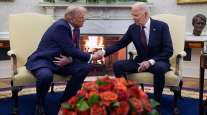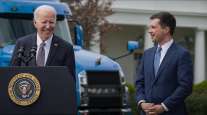Senior Reporter
Biden Promotes Social Infrastructure

[Stay on top of transportation news: Get TTNews in your inbox.]
At his State of the Union on March 1, President Joe Biden is expected to promote aspects of a nearly $2 trillion social infrastructure budget that dominated Democrats’ agenda last year.
The White House has signaled that in his upcoming address to Congress, Biden will outline a path forward for portions of the House-passed Build Back Better Act. The president has repeatedly touted climate change and social safety net proposals tucked in the comprehensive budget measure, even as the Democratic-led Senate has yet to schedule its consideration this year.
“The president continues to bring it up because, as we talk about the impact of inflation, which most people experience in their daily lives as rising costs, one of the ways that we can address that is by passing legislation that will help lower costs for Americans, whether it’s child care or health care or the cost of prescription drugs,” White House press secretary Jen Psaki recently told reporters.
“So, what is encouraging to the president is that there is broad support for lowering costs for the American people in all of those categories and for making the tax system more fair. And we are continuing to work in lockstep and in partnership with a range of senators. And they’re having their own discussions about moving these efforts forward,” Psaki added.
It remains unclear what aspects of the Build Back Better Act, if any, would gain traction in the House and Senate. Democrats who control the congressional chambers have suggested focusing on climate change provisions, efforts to expand alternative transportation technologies and plans for boosting the federal social safety net.
For it to pass in the Senate without Republican backing, congressional leaders would need to ensure its 50 members are on board. This kind of budget bill is able to advance by a simple majority via a procedural reconciliation process in the Senate.
However, Congress appears to have shifted to other priorities ahead of the November midterm elections. A group of Democrats have announced plans to pursue a gas tax holiday aimed at offering relief for the middle class. A Supreme Court nomination is likely to dominate the Senate’s calendar and transportation policymakers continue to draw attention to the implementation of the $1 trillion Infrastructure Investment and Jobs Act. The measure was enacted Nov. 15.
Sen. Tom Carper (D-Del.), chairman of the Environment and Public Works Committee on surface transportation, recently said, “The first week as chairman and ranking member of EPW, Sen. [Shelley Moore] Capito and I met with President Biden to talk about the need for bipartisan water and transportation infrastructure legislation. We knew that we could lead the way in the EPW committee with drinking water and wastewater infrastructure legislation and a surface transportation reauthorization.”

Carper
Carper continued, “Now, those bipartisan efforts by our committee have led to historic infrastructure legislation that is being implemented across our country each day, helping deliver cleaner water and safer roads to the American people. I’m grateful for my partnership with Sen. Capito in this extraordinary achievement, and I know that we will have many more bright days to come, working side by side.”
A foreign policy crisis in Europe also is high on the lawmakers’ radar. House Speaker Nancy Pelosi (D-Calif.), who determines the legislative trajectory with Majority Leader Chuck Schumer (D-N.Y.), addressed the foreign policy moment.
“Many of us have visited Ukraine and have seen that they love democracy. They do not want to live under [Russian President] Vladimir Putin,” the speaker told reporters on Feb. 23. “He does not want the Russian people to see what democracy looks like, and therefore he wants to bring them under his domain, in his domain.”
Meanwhile, congressional appropriations committee leaders indicated they arrived at a “framework” for overall spending levels for the remainder of the fiscal year. Federal funding authority expires March 11. “I am pleased that Congress has passed a continuing resolution through March 11, ensuring that the government will remain open as we continue our bipartisan, bicameral negotiations on [fiscal year 2022] bills,” said Senate Appropriations Committee ranking member Richard Shelby (R-Ala.). “We are making progress under our omnibus framework, but there’s still a lot of work to be done. This will provide us additional time to complete our work.”
Want more news? Listen to today's daily briefing below or go here for more info:




